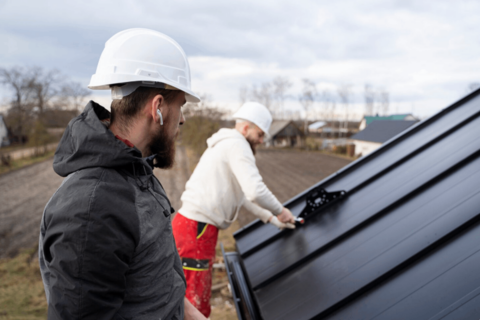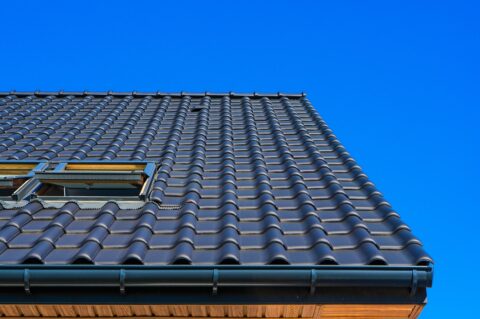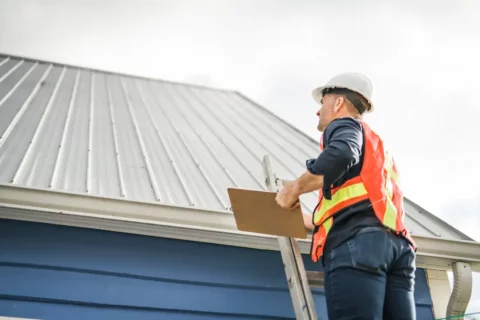
What color of asphalt shingles last the longest in Colorado?
When choosing asphalt shingles for your roof in Denver, Colorado, durability is key, and the color you choose plays a significant role in how long your shingles will last. Denver’s high altitude, abundant sunshine, and fluctuating temperatures can take a toll on roofing materials, making it essential to choose wisely. But did you know that the color of your shingles can directly impact their lifespan?
While many homeowners select shingle colors based on aesthetics, factors like UV exposure, heat retention, and energy efficiency are equally important to consider. Lighter-colored shingles can reflect more sunlight and help keep your home cooler, while darker shingles tend to absorb more heat, which could shorten their lifespan in Denver’s intense sun.
In this blog post, we’ll explore which shingle colors are best suited for Denver’s climate, how color affects the longevity of asphalt shingles, and other key factors that will help you make an informed decision. Whether you’re concerned about energy efficiency or want your roof to last as long as possible, understanding the impact of shingle color is crucial for long-term durability and performance.
Climate Considerations in Denver, Colorado
Denver’s unique climate plays a significant role in the longevity of roofing materials, particularly asphalt shingles. Situated at a high altitude, Denver experiences more intense sunlight and higher UV radiation levels than lower-elevation cities. These UV rays can cause shingles to deteriorate faster, especially if the wrong color or material is chosen.
Additionally, Denver’s weather is characterized by significant temperature fluctuations. It’s not uncommon for daytime temperatures to soar into the 90s during summer, then drop dramatically at night. These swings can cause roofing materials to expand and contract, leading to potential cracking or wear over time. Winter brings its own difficulties, including heavy snowfall and occasional hailstorms, which can add further strain on your roof.
Choosing the right color of asphalt shingles becomes crucial in managing these climate challenges. Shingles that can withstand the intense UV exposure and help regulate temperature fluctuations are ideal for ensuring your roof’s longevity. Lighter colors tend to reflect more heat, which can be beneficial in Denver’s climate, while darker shingles may absorb too much heat, leading to quicker degradation. Understanding these climate considerations will help you choose shingles that perform well and last longer in Denver’s diverse weather conditions.
Importance of Shingle Color in Asphalt Longevity
The color of asphalt shingles can significantly impact their longevity, especially in a climate like Denver’s. Shingle color directly affects how much heat your roof absorbs or reflects. Darker shingles tend to absorb more sunlight, causing the roof’s surface temperature to rise. This can lead to faster wear and tear on the shingles as well as higher energy costs for cooling your home in the summer months. In Denver, where UV rays are stronger due to the high altitude, this effect is even more pronounced.
Conversely, lighter-colored shingles reflect more sunlight, helping to keep roof temperatures lower. This can prevent premature aging of the asphalt and reduce the strain on your shingles, allowing them to last longer. In a city like Denver, where intense sunlight and temperature fluctuations are common, selecting a color that minimizes heat absorption is crucial.
By choosing a shingle color that better suits Denver’s climate—often leaning toward lighter shades—you can extend the lifespan of your roof. While aesthetics are important, understanding the role of color in durability is key to ensuring your shingles stand up to the challenges of Denver’s harsh weather conditions for years to come.
Light vs. Dark Colored Shingles: Which Last Longer?
When it comes to choosing between light and dark-colored asphalt shingles in Denver, the difference in longevity can be significant. Light-colored shingles tend to last longer because they reflect more sunlight, reducing the surface temperature of your roof. In a city like Denver, where high-altitude exposure leads to stronger UV rays and intense heat during the summer, this ability to reflect heat is crucial. By keeping the roof cooler, light shingles experience less thermal expansion and contraction, which helps reduce wear over time.
In contrast, dark-colored shingles absorb more heat, leading to higher roof temperatures. This can accelerate the degradation of the asphalt, causing the shingles to crack, warp, or deteriorate faster. While dark shingles may be aesthetically pleasing and can help melt snow in winter, the intense heat they retain during Denver’s hot summers may reduce their overall lifespan.
In Denver’s climate, light-colored shingles generally perform better in terms of durability because they are less affected by the sun’s harsh rays. While dark shingles may have their benefits in colder climates, the heat and UV intensity in Denver make light-colored shingles a better choice for long-term roof longevity and energy efficiency.
Impact of UV Rays on Asphalt Shingles
The impact of UV rays on asphalt shingles is a critical factor in determining their longevity, especially in a high-altitude city like Denver where sunlight is more intense. UV radiation degrades the protective oils in asphalt shingles, making them brittle, prone to cracking, and reducing their waterproofing capabilities over time. This process is accelerated in regions with higher UV exposure, making shingle color an important factor in extending the life of your roof.
Shingle color plays a key role in how much UV damage occurs. Lighter-colored shingles reflect more UV rays, helping to minimize the harmful effects of sunlight on the roofing material. This reflection decreases the amount of heat absorbed by the shingles, slowing down the rate of deterioration and extending their lifespan. In contrast, darker shingles absorb more UV rays, causing them to heat up more quickly and break down faster.
In Denver’s climate, where the combination of intense UV exposure and fluctuating temperatures is common, choosing lighter-colored shingles can make a substantial difference in longevity. By reducing the impact of UV rays, lighter shingles help ensure that your roof endures the challenges of the sun’s rays, ultimately leading to a longer-lasting and more durable roof.
Best Shingle Colors for Energy Efficiency in Denver
Choosing the best shingle colors for energy efficiency in Denver is closely tied to the debate between light and dark-colored shingles. As previously mentioned, light-colored shingles reflect more sunlight, which helps keep roof temperatures lower. This reflective quality not only extends the lifespan of your shingles but also improves energy efficiency by reducing the amount of heat transferred into your home during Denver’s hot summers.
In contrast, dark-colored shingles absorb more sunlight and heat, raising the overall temperature of your roof and, subsequently, your home. This heat absorption can increase cooling costs as your air conditioning system works harder to maintain a comfortable indoor temperature. While dark shingles may offer slight advantages in the winter by helping to melt snow more quickly, the long, sunny summers in Denver mean the heat-retaining properties of dark shingles could lead to higher energy bills throughout much of the year.
For optimal energy efficiency in Denver’s climate, light-colored shingles are the better option. They reduce heat buildup, which not only preserves the shingles themselves but also helps lower energy costs. By reflecting more sunlight and heat, light shingles offer both durability and cost savings, making them the ideal choice for Denver homeowners seeking energy efficiency.
Maintenance Tips for Long-Lasting Shingles
Maintaining your asphalt shingles is key to ensuring their longevity, especially in Denver’s challenging climate. While the color of your shingles plays a significant role in how long they last, regular maintenance can further extend their lifespan and help protect your roof from premature wear caused by UV exposure and temperature fluctuations.
One of the most important maintenance tasks is inspecting your roof frequently for signs of damage, such as cracks, curling, or missing shingles. Lighter-colored shingles, which reflect more UV rays and heat, may show less heat-related damage, but all shingles, regardless of color, should be checked to ensure they are in good condition. Keeping gutters clean and free of debris also helps prevent water buildup, which can cause moisture damage to your shingles over time.
Another key tip is addressing any repairs immediately. Even minor issues, like a small crack in a dark-colored shingle, can worsen quickly under Denver’s intense sunlight. Sealing any cracks or replacing damaged shingles promptly will help prevent further deterioration.
In short, while choosing the right shingle color improves your roof’s ability to withstand the elements, regular maintenance is equally important. By combining the right color choice with proper upkeep, you can maximize the lifespan of your asphalt shingles in Denver.
Conclusion: Choosing the Right Shingle Color for Denver
Choosing the right color for your asphalt shingles is a crucial decision that impacts both the longevity of your roof and the energy efficiency of your home in Denver. With the intense UV exposure, fluctuating temperatures, and unpredictable weather patterns, it’s essential to select shingles that can stand up to the local climate. Light-colored shingles are often the best choice for long-term durability and energy savings, but every home is unique, and other factors may come into play.
If you’re unsure about the best shingles for your roof or want expert advice tailored to your specific needs, our team is here to help. We offer free consultations and roof evaluations to ensure you are making the best choice for your home. Our skilled professionals will evaluate the condition of your roof, and discuss the ideal shingle color options for Denver’s climate, and provide recommendations to maximize the lifespan and efficiency of your roof.
Don’t leave your roof to chance—contact us today to schedule your free consultation and roof evaluation. Let us help you make a well-informed decision that will protect your home and save you money for years to come.



